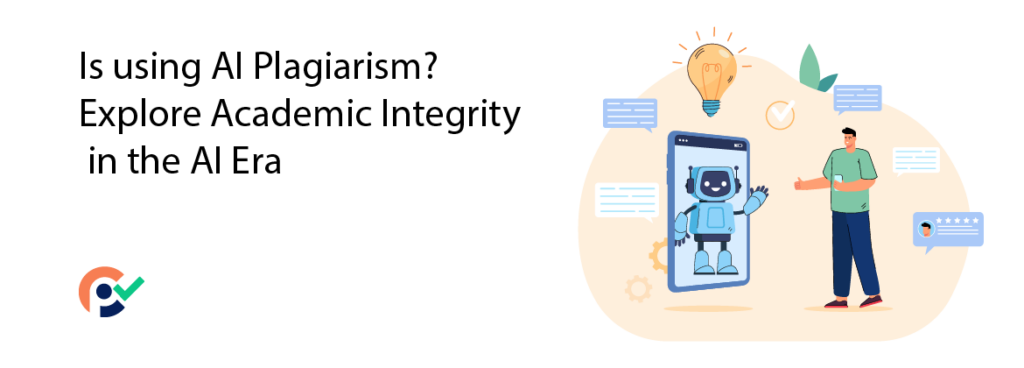
Is Using AI Plagiarism? Explore Academic Integrity in the AI Era
AI, or Artificial Intelligence, has become the cornerstone of this age, and it is nearly impossible to find a field that has remained untouched by its marvels. From medical diagnosis to space missions, AI assists humans and poses challenges equally. The educational sector is also one of the prominent fields where AI has served humans.
It is predominantly involved in reshaping the way how students acquire education, instructors deliver it, cheating patterns, helpful methods, and much more. AI is assisting academics and at the same time posing a threat to its integrity.
For instance, where the students benefit from AI by verifying the originality of their writing, it can also undermine the credibility of their work if they generate their assignments from AI.
Striking a good balance between leveraging AI and maintaining academic integrity is required. Let’s dive into the article below and learn how to maintain academic integrity in the era of artificial intelligence.
Understanding Academic Integrity
Academic integrity is the set of rules and moral codes that uplift a healthy culture while acquiring and delivering education. It means implementing honesty, trust, fairness, respect, and responsibility. Therefore, academic integrity is maintained if everyone in an educational environment performs their responsibilities while following these ethical standards. On the other hand, violating these moral values leads to academic dishonesty, which includes plagiarism, cheating, data fabrication, etc.
Impacts of AI on Academic Integrity
Cheating via Generative AI
Generative AI is the biggest threat to academic integrity in this AI era. This technology offers many tools and Chatbots like ChatGPT, Gemini, Llama, Copilot, etc.
These tools can provide human-like results by entering the desired prompt. As a result, students can create assignments, essays, theses, and even complete dissertations in a single query.
Here a question arises Is using AI plagiarism? Students must know that there is no harm in utilizing such tools to get information and understand critical concepts, generating complete writing tasks falls under academic dishonesty. Apart from cheating, using generative AI may also pose the probability of false data, outdated stats, and plagiarism in students’ work. Always check your papers for plagiarism before submitting them to your teachers or instructors.
Questionable AI Scoring Systems
AI has enabled institutes and educators to evaluate students’ written tasks automatedly. Natural language processing, widely known as NLP technology, can comprehend the human written language, which is implied in assignment or essay checking.
These AI-driven automated essay scoring and feedback systems help provide examiners with quick and consistent evaluation and grading. However, their use also raises concerns about fair grading and bias.
Moreover, students can also identify and exploit these systems’ glitches to their advantage. For instance, students may tailor their writing to meet the specific needs of AI evaluation systems rather than putting effort into comprehension and authenticity of work.
Undermining Learning Process
As foretold, there is nothing wrong with getting assistance from AI tools and technologies. However, solely relying on them for every task can undermine the learning process.
For instance, crafting entire assignments and their citations from AI tools, copying others’ scholarly work by using tools, etc., are not only forms of cheating but might also hinder their ability to learn and understand.
If they continue using AI to bypass critical thinking and problem-solving tasks, they will miss out on the educational experiences that develop essential skills. Consequently, it seriously compromises academic integrity and educational well-being.
Upholding Academic Integrity in the Age of AI
Here are the ways how AI can help uphold integrity in education.
AI-Powered Plagiarism Detection
Plagiarism is a significant challenge that undermines academic integrity. Having a plagiarism check is vital to combat that issue. However, manual plagiarism detection isn’t fruitful and applicable nowadays. The AI-powered plagiarism checker is nothing more than a blessing for pupils and educators.
The tool uses cutting-edge AI algorithms to understand the submitted text and its underlying context. Then, it scrapes the entire web, including giant databases, scientific journals, scholarly informational resources, and other web pages, to identify instances of plagiarism.
Similar tools available in the past detected textual similarities. However, AI has allowed present-day plagiarism tools to be more sophisticated and capable of identifying not only verbatim but also other forms of plagiarism, such as patchwork, mosaic, improper rewriting, and contextual plagiarism.
AI-Based Paraphrasing
Students can leverage the AI plagiarism detection tool to account for probable chances of plagiarism. However, identifying plagiarism isn’t enough. To maintain integrity, they have to make their written work plagiarism-free and original. AI can greatly contribute to eradicating those instances of plagiarism and making it unique.
This can be done with the aid of a free paraphrasing tool integrated with the power of AI. The smart machine learning and NLP patterns carefully comprehend human writing and its contextual meaning and identify every grammatical component.
Then, the replaceable words are substituted with better synonyms (like for common verbs and adjectives), and the arrangement of words in their sentences is redefined. As a result, the paraphrasing provides an entirely distinct version of the submitted text, eliminating plagiarism.
Conclusion
AI has emerged as a revolutionizing technology that transforms every walk of life. When it comes to education, AI has also impacted multiple aspects. Where students can leverage quick assignment-making and citation generation, it also questions the credibility and originality of work. It has become quite difficult to maintain academic integrity. However, educational institutions can take a proactive role in teaching the ethical use of AI and defining the boundaries. Instructors can guide them on what constitutes acceptable use of AI in academic work, ethical considerations, and potential risks involved. So that students are aware of the importance of academic integrity and how to maintain it in an era of AI.







